How to Acquire Valuable Users with Apple Ads Brand Campaigns
 Gabriel Kuriata
Gabriel Kuriata Brand campaigns of search results ads in Apple Ads target keywords associated with your brand. Focusing on engaged users looking for a specific app allows them to achieve exceptional results. However, they require a strategic approach to building brand awareness, aligning with app store optimization (ASO), and carefully monitoring competitors’ actions.
Brand campaigns can drive highly engaged users with high lifetime value (LTV) to an app’s product page. Compared to competitor and category campaigns, they will most likely have an outstanding return on ad spend (ROAS), tap-through and conversion rates (TTR and CR), cost per acquisition (CPA), or any other goal-related metrics.
SplitMetrics Acquire, including its free Starter Plan, offers dedicated features for managing and optimizing brand campaigns, such as Brand Protection. Other features like Keyword Discovery, Automation, and advanced, full-funnel analysis will also significantly impact their performance.
No campaign type in Apple Ads transfers each dollar spent into revenue like brand campaigns, so make sure their optimization is spot on.
This article will show you how to excel with brand campaigns, amplifying them with our platform, SplitMetrics Acquire. We also address all considerations newcomers to Apple Ads have before launching them.
Brand keywords target search terms introduced by users to find and typically download a particular app. This results in high conversion rates on the App Store and, most importantly, high post-installation conversions for activities with revenue-generating potential, like in-app purchases, subscriptions, etc.
Brand awareness is a key factor when assessing the value of these keywords for an individual app. Logically, a new app might make brand keywords more impactful only after investing resources in marketing activities that can drive it. Understanding the following characteristics of brand keywords before launching successful campaigns is essential.
Branded keywords are highly relevant in the App Store’s Search. Even though each app category has unique search patterns driven by different intents behind their search queries, those containing names of apps or developers always remain a high-priority user acquisition source.
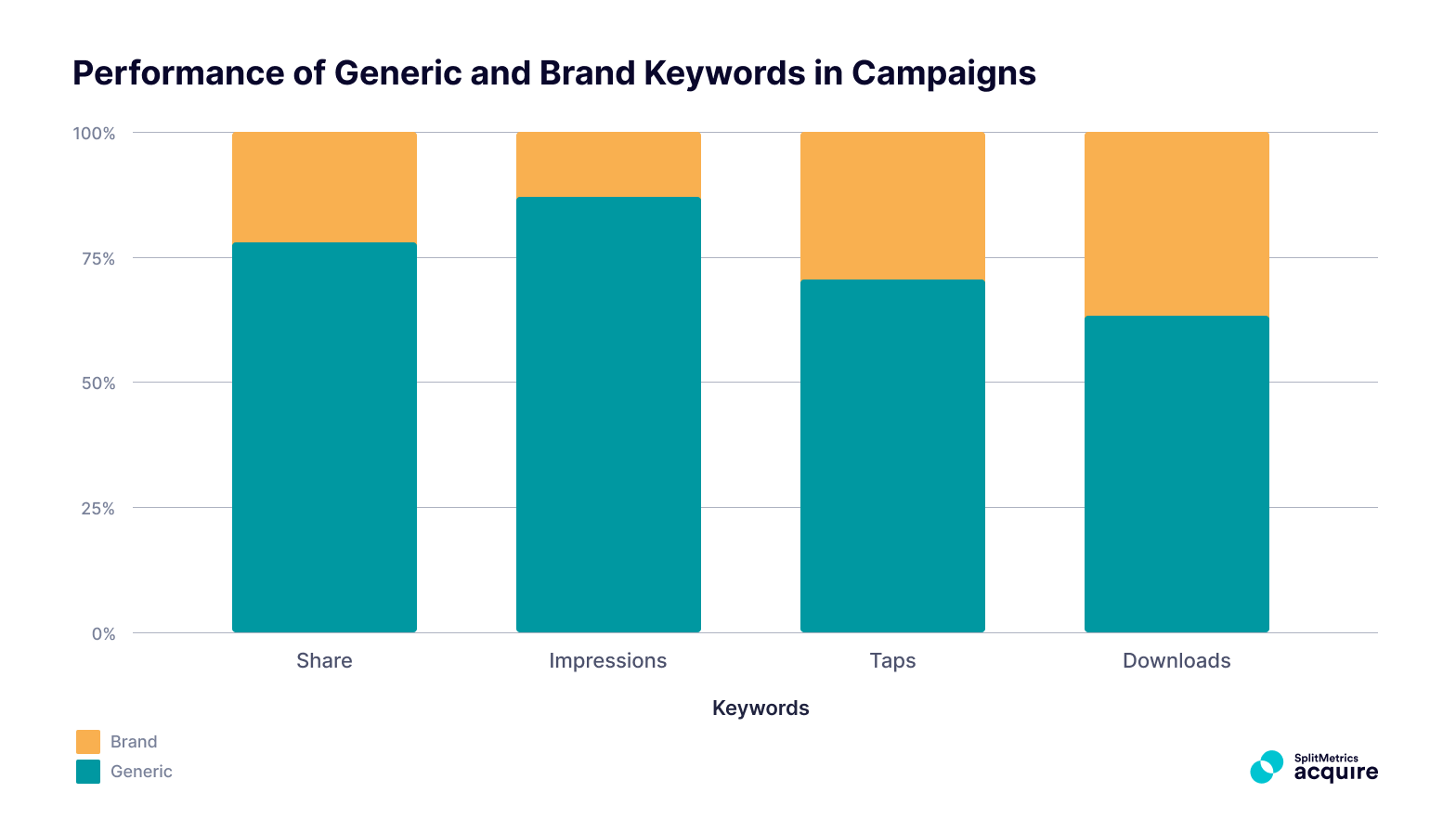
Branded keywords perform exceptionally well in terms of their tap-through and conversion rates, something well visible on the chart below:
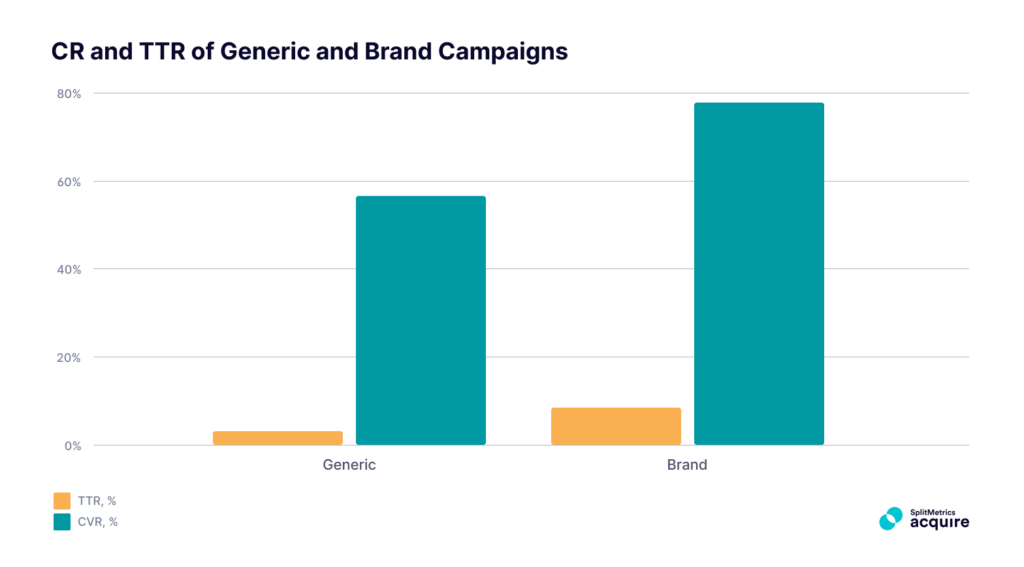
Brand keywords may reach high organic search positions more quickly than category ones, being typically unique and placed in highly impactful metadata fields on the App Store, like the app’s name and in some cases subtitle (a publisher’s name may also potentially gain traction, depending on brand awareness).
Consequently, running brand campaigns may frequently create a situation where organic search and search results ads appear together and it’s essential to align paid user acquisition with ASO strategy.
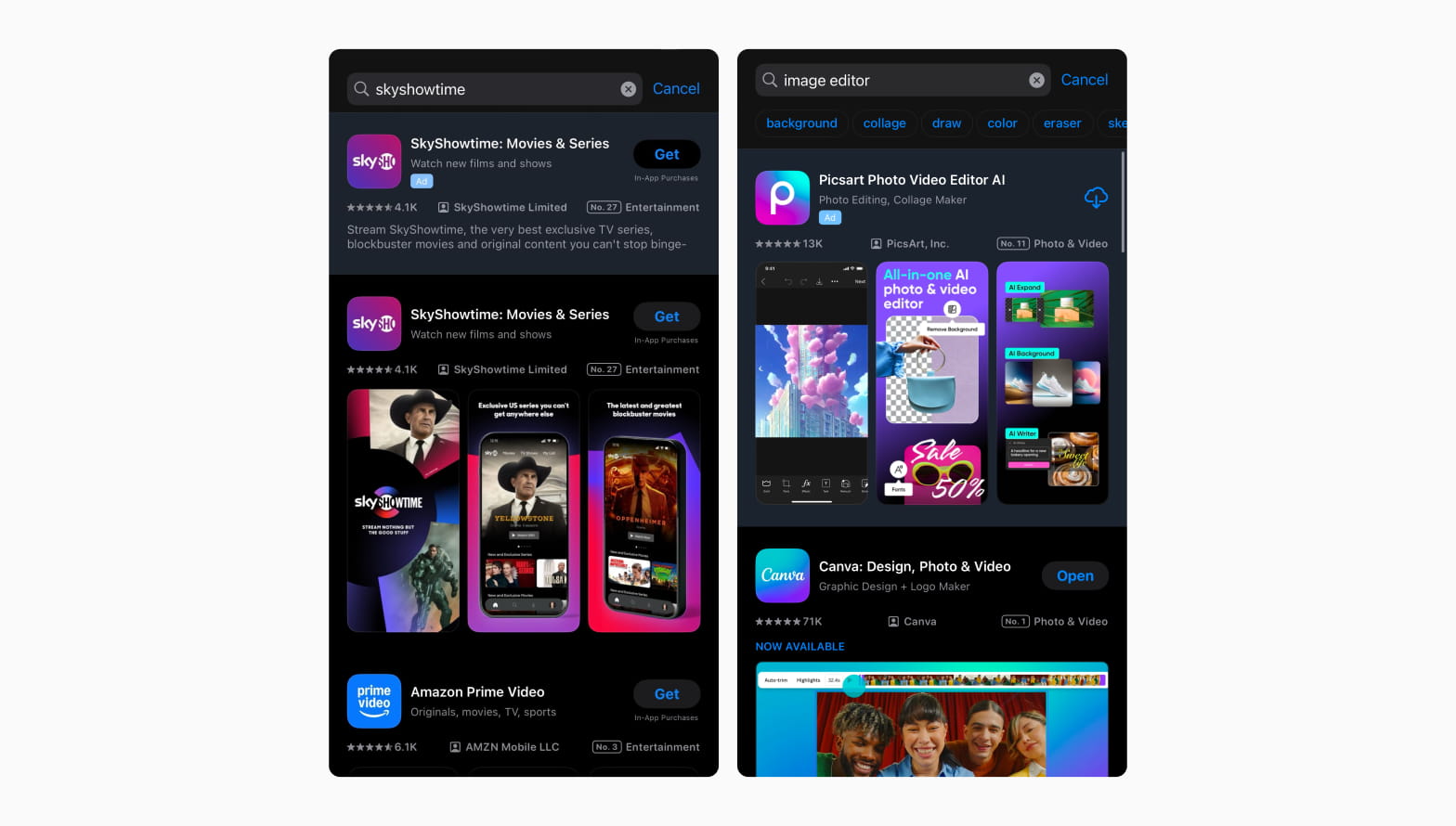
This property and likely outcome for apps running brand campaigns with search results ads can be addressed in several ways, which we also discussed in our article on achieving synergy between app store optimization (ASO) and Apple Ads.
Don’t hesitate to bid on brand keywords you’re ranking organically for, as targeting them with search results ads is probably a factor behind their organic positions. You may optimize your bids to maintain an acceptable impression share level.
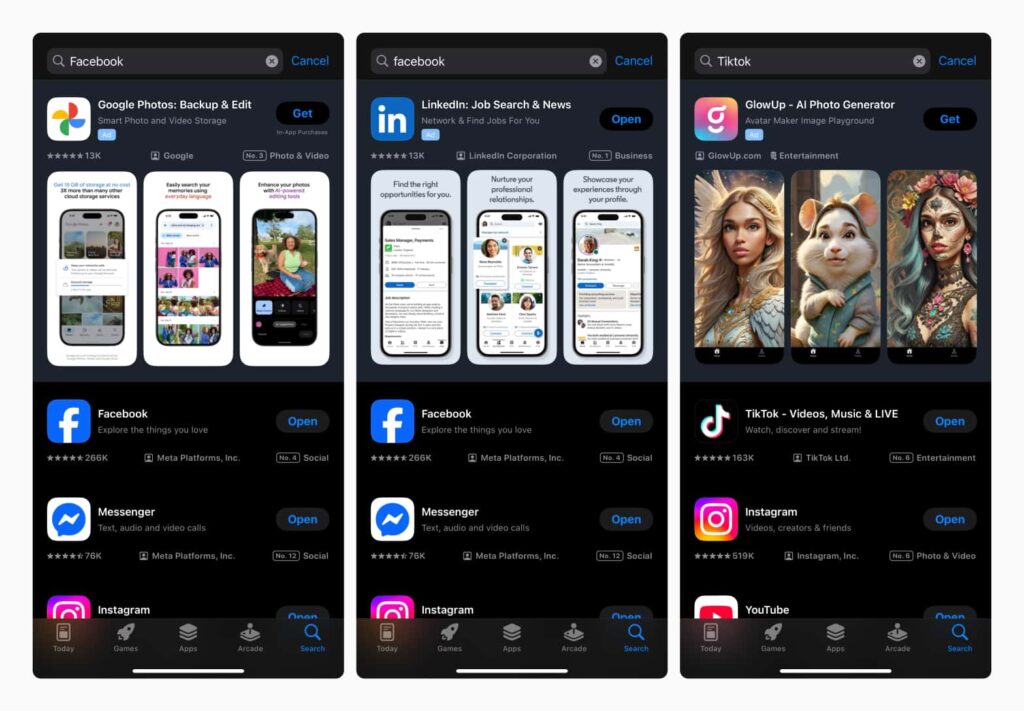
However, abandoning brand keywords with top organic positions increases the risk of a competitor taking over your place and displaying a full-featured search results ad above your organic position.
Brand Protection is a feature of SplitMetrics Acquire, available also in the free Starter Plan that will help you immediately spot branded keywords that need your attention. Remember, your brand keywords might be someone else’s competitor keywords, and vice versa.
Some important considerations must be made before launching brand campaigns, especially from the perspective of a small—to medium-sized developer promoting a new mobile app or game.
Including a unique keyword in an app’s name is highly advisable to benefit the most from brand campaigns. Most mobile apps follow this practice. For example, “tonestro – Music Lessons” or “italki” – Language Learning”. In both these cases we can assume the highest download intent behind search terms such as “tonestro” and “italki”, as they without any doubt point to very specific apps.
Apps without such words in their names may still use unique word combinations. In such cases, we’d advise careful monitoring and optimization to ensure we understand the intent behind each keyword and capture it adequately.
This approach is also advised for discovery campaigns. Resorting to negative keywords may improve the accuracy of finding new opportunities.
Apps with entirely feature-related names may find it challenging to run proper brand campaigns but may still grow through competitor and category ones. Also, an app name can always be modified as part of our app store optimization (ASO) strategy. Again, comprehensive competitive research is advised.
Again, category-level and individual factors make generalizations difficult. For example, some apps may observe more competitive pressure on brand keywords than others due to ongoing competitor campaigns. This may be less of an issue for categories with rich feature-related keyword pools, which give advertisers more targeting options besides brand keywords belonging to competitors.
This may apply only to a subcategory of apps with new, popular features (like AI) that encourage advertisers to pursue more courageous marketing strategies.
The key takeaway from these factors is that ASO competitive research and app keyword research are critical to success on the App Store.

Take all these factors into consideration because they may call for additional steps that will increase the likelihood of your success. These steps are mainly related to building brand awareness and aligning your ASO and Apple Ads strategies to achieve a synergistic effect.
Keyword Discovery in SplitMetrics Acquire will allow you to investigate keywords your competitors target in Apple Ads thoroughly. Additional insights from our Brand Defense feature will make it easy to evaluate their brand strategies!
The goals of brand campaigns in Apple Ads should be clear now, considering the potential and considerations related to branded keywords explained above. To summarize, they are:
Brand campaigns are crucial for user acquisition because they will direct highly engaged users with high potential lifetime value to your app’s product page. They can also potentially help your organic search results reach the top positions, comfortably securing the top spot with a search result ad and an organic result.
Brand defense involves actively bidding on the broadest range of valuable brand keywords possible and maintaining a specific impression share for them. Neglecting them may result in competitors targeting users and displaying ads on your branded keywords. In some categories, this may be a more significant goal than in others.
In most cases, these goals are accomplished simultaneously. Brand keywords’ ability to drive valuable users to your app’s product page warrants dynamic, proactive bidding, which drives downloads and protects them from being taken over by competitors.
However, successful optimization requires more factors, so let’s examine them now.
Brand campaign optimization should consider all the factors and brand keyword specifics discussed above.
A transparent, organized campaign structure is essential to maintaining orderly, data-driven optimization and managing Apple Ads.
Brand keywords should always be organized into a separate campaign, regardless of whether a semantics-based or value-based approach to structuring is chosen.
Semantically, brand keywords address high intent and a very specific one: users looking for a particular app. Such an approach also streamlines analysis, making brand defense easier. This makes them top-tier keywords in terms of value.
A proper campaign structure is critical because it will help you:
Additionally, Brand campaigns are always set to an “Exact match” setting to maximize their effectiveness.

Comprehensive keyword research will allow you to target all branded keywords, as each left unattended (not actively bid on) is an opening a competitor can take advantage of by promoting their app.
This is why SplitMetrics Acquire’s Keyword Discovery feature can significantly help brand campaigns. It provides three ways to research keywords: analyzing your app and competitors or expanding your direct input.
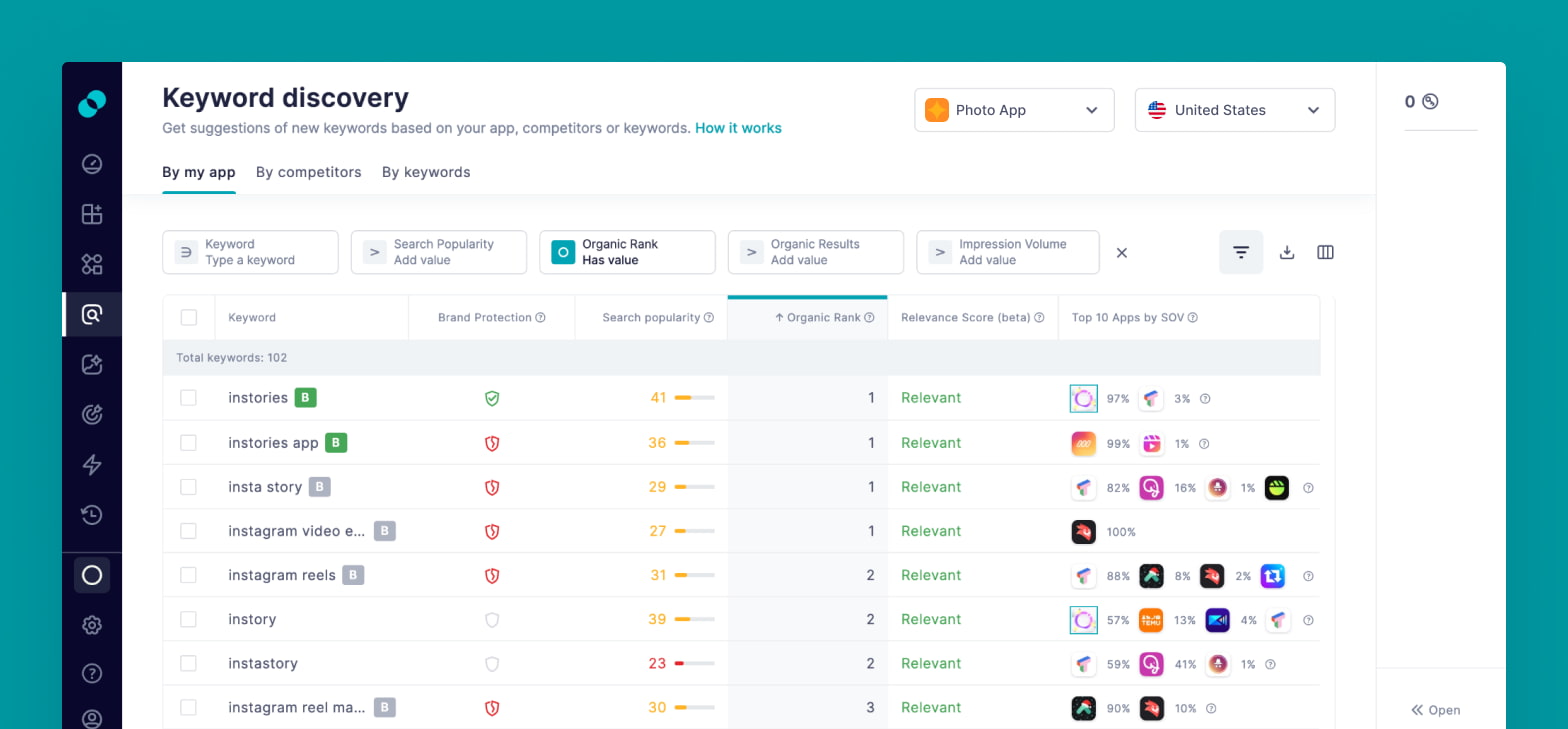

Monitor the Apple Ads metrics listed below, as they are crucial to the performance of your brand campaigns.
Impression share informs you about the percentage of views your app received among all that advertisers generated. An impression share above 95% for a specific, exact-match keyword means that users using that keyword will see your ads almost exclusively. Thus, impression share is a vital metric for brand campaigns.
Cost Per Acquisition (CPA) is crucial for brand campaigns in Apple Ads as it measures the cost of acquiring new users, ensuring cost-effective campaigns. By tracking CPA, advertisers can evaluate the return on investment (ROI), optimize ad spend, and defend their brand by efficiently targeting high-intent users searching for their app or brand name.
Return on ad Spend (ROAS) and Cost per goal (CPG) will truly show the value of brand campaigns, which is their ability to drive users who are likely to engage with your app after installing it, with a high likelihood of generating revenue.
Integrating with a mobile measurement partner (MMP) is necessary to connect post-install metrics with Apple Ads campaign data. SplitMetrics grants users a centralized, unified view for all the metrics, allowing advertisers to use them in day-to-day optimization and analysis.
Brand Protection is a feature dedicated to brand campaigns in Apple Ads. It is available in the free SplitMetrics Acquire Starter Plan and the enterprise version of our platform. It’s a remarkable visual indicator integrated with our Ads Manager to show how well a branded keyword is protected.

However, its usefulness extends beyond brand campaigns to competitor campaigns. Integrated with our Keyword Research tool, it will show you which competitor keywords might be worth targeting.
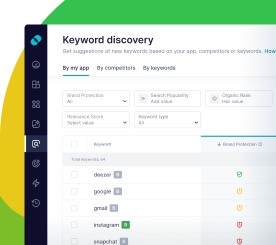
Aligning app store optimization (ASO) with Apple Ads is especially important to brand campaigns. You’ll typically achieve high organic rankings for your branded keywords, making them co-displayed along search results ads.
In our article on achieving a synergy between ASO and Apple Ads, we recommend a comprehensive approach to managing search results. This approach prioritizes the user experience of people using the App Store’s search feature.
Localizing your app’s product page is the most straightforward way to encourage a download from someone looking for it. Localizing an app always positively impacts tap-through and conversion rates and is vital for brand campaigns.
The bidding strategy should reflect the potential of brand campaigns. Brand campaigns contain the most valuable keywords available for an app, warranting a more courageous approach.
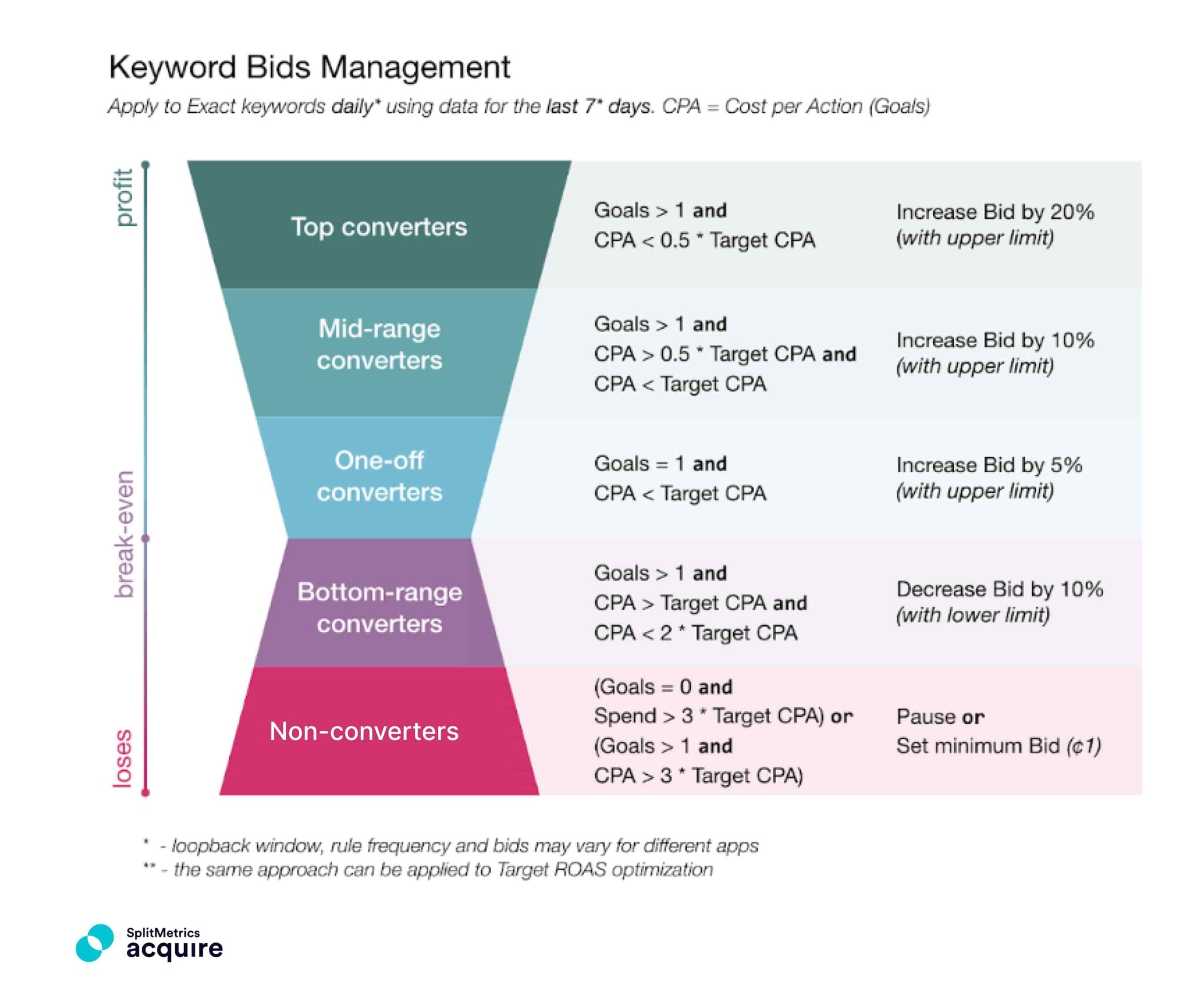
However, we recommend a flexible approach to brand campaigns because of brand protection. As we mentioned, competitors may be encouraged to bid on brand keywords that do not belong to them, ultimately impacting their profitability. This depends heavily on the app category or even sub-category.
The decision whether to cross your target maximum CPA or CPG to protect a strategic keyword will depend on many factors, including the number of users gained in the process, for example, but remembering the following should be helpful:
High brand awareness will impact the number of App Store searches related to your brand. To achieve it, you may need to invest in awareness campaigns, which can be done with Apple Ads and many other app marketing activities.
Invest in additional placements in Apple Ads, such as Today tab ads, search tab ads, and product page ads. However, for the best results, use a holistic, multi-placement ad strategy to establish many points of contact with potential users.
There are many more opportunities on the App Store: pre-order campaigns, in-app events, working towards featuring your app, and so on. These are all part of a good ASO strategy.
A holistic approach to connecting with users works best because a user’s path to download will most likely include several steps and even product page views. This is why it’s essential to run all types of search results ads campaigns in Apple Ads: brand, competitor, category, and discovery.
Over time, branded keywords will become more prominent in user acquisition. Users will continue to see your app on competitors’ product pages, in various search results, etc.
This is also why aligning your ASO and Apple Ads strategies is vital to success. Ultimately, both organic and paid search will contribute to your better recognition.
Automating Apple Ads will allow you to react immediately to changing competitive landscapes and market conditions. Our platform grants access to condition-based automation, enabling you to trigger protective bidding should, for example, the impression share of one of your keywords in the brand campaign drop below a certain threshold. Moreover, the platform can maintain a certain impression share level that does not exceed the desired spending level.
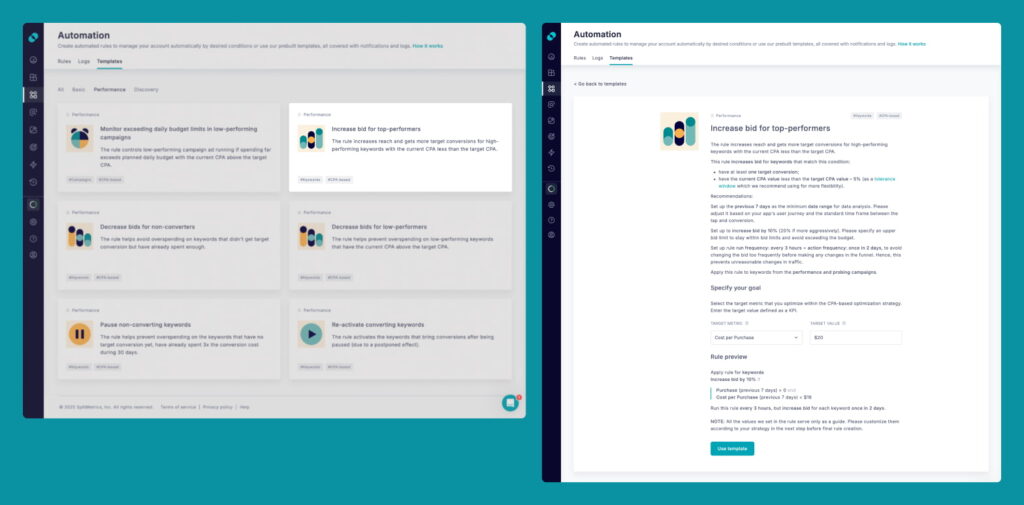
Brand campaigns are an essential part of Apple Ads. Once correctly aligned with ASO, they acquire valuable users for our app and help an app establish a strong presence on the App Store.
Never neglect them; take advantage of the free SplitMetrics Acquire Starter Plan’s features to run them much better than your competitors!
